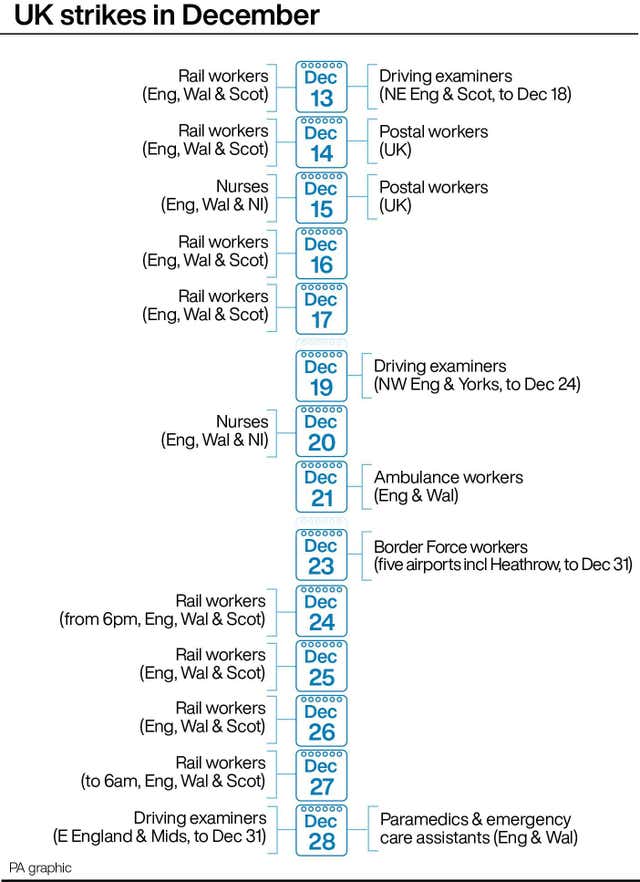A month of rail disruption has begun, with workers walking out in the first of a wave of 48-hour strikes, as nurses prepare to take unprecedented industrial action.
Members of the Rail, Maritime and Transport (RMT) union are pressing ahead with two 48-hour strikes at Network Rail – and 14 train companies – from Tuesday and Friday.
Trains are only running from 7.30am to 6.30pm on this week’s strike days, although many parts of the country will have no services, including most of Scotland and Wales.
But with further walkouts planned, Network Rail has warned there will be significantly reduced services, with trains more crowded and likely to start later and finish earlier until January 8.
Asked if there is a glimmer of hope in the negotiations, Network Rail chief executive Andrew Haines told BBC Breakfast: “It’s hard to see that today. I’ve learned, you know, through a long
career, that sometimes the light is just around the corner.
“But where I stand today, I’d have to say that with the level of disruption the RMT are imposing, the way forward isn’t obvious.”
But Transport Secretary Mark Harper said “almost 40%” of RMT members at Network Rail voted in favour of an offer to resolve the dispute despite “a very clear instruction from their union leadership”.
He told GB News: “I think the tide is turning on people seeing that the offers we have made are reasonable, taking into account both the travelling public but also the interest of taxpayers.”
The RMT said 63.6% voted to reject Network Rail’s offer on an 83% turnout.
As @RMTunion members begin another round of #RailStrikes to defend jobs, pay and conditions, general secretary Mick Lynch joins the picket line at Euston.#SupportRailWorkers pic.twitter.com/lHO92NspSV
— RMT (@RMTunion) December 13, 2022
The Office for National Statistics said 417,000 working days were lost to labour disputes in October, which is the highest since November 2011.
Talks to avert the nursing strike have failed after the union leader behind the action accused Health Secretary Steve Barclay of “belligerence” and refusing to discuss pay.
Royal College of Nursing (RCN) general secretary Pat Cullen said nurses are “not getting an extra penny” despite their talks on Monday.
Nurses in England, Wales and Northern Ireland now seem set to begin their first day of strike action on Thursday, with a second date set for Tuesday.
Cabinet minister Oliver Dowden warned that the Government “cannot eliminate” the risks of a wave of strike action throughout the month after chairing an emergency Cobra meeting on Monday.
He said ministers will be “straining every sinew” to minimise the disruption, with paramedics, postal workers and Border Force officials among those scheduled to walk out.
Health minister Will Quince admitted that taxis could be used to transport patients during ambulance strikes on December 21 and 28.
He told MPs it is “likely” that category one and two calls “where there is an immediate threat to life will be responded to”.
On our strike hub you can find:
✔️ Latest strike dates
✔️ Resources to support the strike
✔️ Information about strike benefit
And more, visit the strike hub here: https://t.co/tj0wNb2vYi#FairPayForNursing pic.twitter.com/TJBNePx1iK
— The RCN (@theRCN) December 12, 2022
But he added: “We are looking at ways in which we can provide additional support for category three and category four, including things such as block-booking taxis and support through community healthcare, local authority fall services and community support.”
RMT workers at Network Rail will also strike from 6pm on Christmas Eve until 6am on December 27.
General secretary Mick Lynch apologised for the disruption caused to passengers.
He told the PA news agency: “I believe we could have worked towards a settlement a couple of weeks ago until that was undermined by the stance that certain people have taken.
“So we do apologise and we hope that people can amend their plans and get to where they need to go during this period, but they can be assured that we’re working to try and get an agreement so that we can end this dispute.”
Network Rail had offered a 5% pay rise for this year – backdated to January – with another 4% at the start of 2023 and a guarantee of no compulsory job losses until January 2025.
The RMT’s executive recommended rejecting the offer, saying it was linked to “significant” changes to working practices.

Talks between Mr Barclay and Ms Cullen failed to find a breakthrough, with the Health Secretary refusing to negotiate on pay.
“The Government was true to its word – they would not talk to me about pay,” the RCN boss said in a statement.
“I needed to come out of this meeting with something serious to show nurses why they should not strike this week. Regrettably, they are not getting an extra penny.”
The union is demanding a pay rise of 5% above the RPI rate of inflation, which was 14.2% in October, but Ms Cullen has hinted that she could compromise if the Government negotiates on pay.
Mr Barclay has been sticking with the independent pay review body’s recommendation of a £1,400 rise.





Comments: Our rules
We want our comments to be a lively and valuable part of our community - a place where readers can debate and engage with the most important local issues. The ability to comment on our stories is a privilege, not a right, however, and that privilege may be withdrawn if it is abused or misused.
Please report any comments that break our rules.
Read the rules hereLast Updated:
Report this comment Cancel